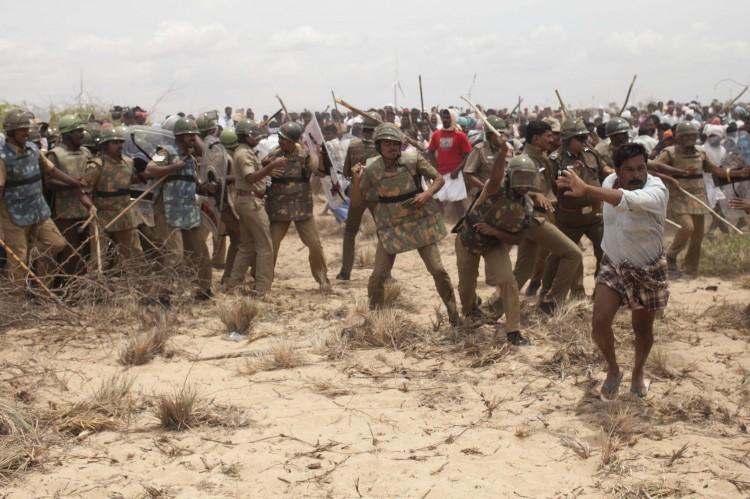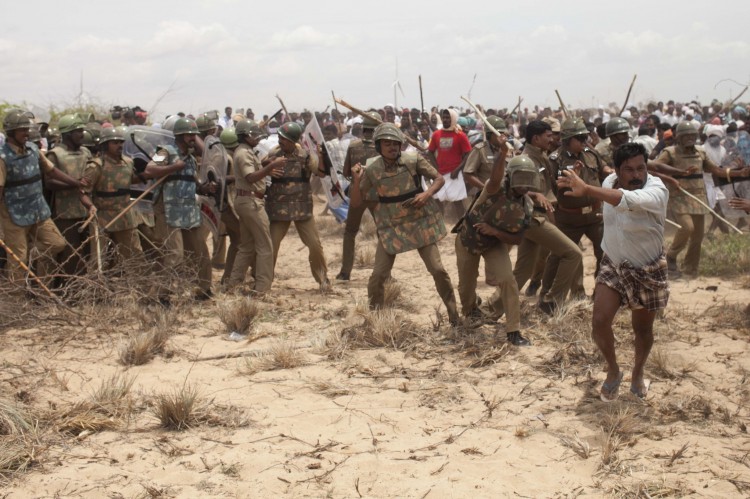The desperate fight by locals to stop India’s newest nuclear power plant from going operational is reaching a tense crescendo.
At least 51 people have been arrested since protest turned violent Monday morning after thousands of people spent the night on a beach within view of the Kudankulam Nuclear Power Project, on the southern tip of India.
On Aug. 31, the Madras High Court refused a petition to stop the commissioning of the controversial project, leading the government to announce it would load uranium into the reactors on Sept. 11.
“Since many weeks government has been talking about filling fuel, however it never gave a specific date. When the High Court hearing went against the protesters, we thought of changing our way of protest and leaving the village,” said Leon a protester from the village of Idinthakarai.
According to Leon, after protesters gathered in front of the church, the government closed all road access to Kudankulam. In response, around 8,000 protesters marched to the beach about a third of a mile from the plant on Sunday.
“The whole day on Sunday we were there and everyone slept during the night on the beach. On Monday morning, as people went home to freshen up and only 300 protesters were present on the beach, police came and started to threaten those present,” explained Leon.
During a dialogue between police and protesters, the police pushed a few people, people pushed back, and the scene rapidly descended into panic and tear gas fire, according to other protesters.
“I was on shore. Police officers and the protesting women were talking. Suddenly the tear gas shell was fired and it burst near my leg. I didn’t expect that such a thing will happen,” said Jeniker, 26, who received five stitches in his leg.
The crackdown was heavily criticized by Greenpeace and Amnesty International.
Locals have argued that the plant is too dangerous. Over a million people live within 20 miles of the plant, which would be an impossible number to evacuate. They worry, in case of a Fukushima-like accident.
In a press release, Greenpeace campaigner Karuna Raina reiterated, “The commissioning of a nuclear power plant should not happen without consensus with the stakeholders.”
According to local media reports, after protestors were sandwiched between the police and the ocean, several of people started to throw sand as their only weapon. A few of the protestors were seen fleeing in boats, and others stood waist deep in water as police and other protesters battled.
Gloudin, a protestor who got injured, described how everything quickly escalated. “Police was surrounding around 300 protestors on Monday morning. Everything happened in fractions of seconds. By the time I turned around, I was hit by a cane on my head,” said Gloudin a father of eight and a fisherman from the village.
On Monday, the protests spread to an adjoining town Tuticorin, where one farmer died after police opened fire Monday evening following a day of clashes. Protests also spread on Tuesday to Chennai and Coimbatore.
The police charged at protestors after they set fire a house on fire. The protestors also blocked the Tuticorin-Nagercoil highway and tried to stop the Mysore Express train at Tuticorin railway station.
On Tuesday the row over setting up the nuclear power plant reached the Supreme Court with a petition seeking directions to restrain the Union government at New Delhi and other authorities from commissioning the controversial project.
In a last ditch effort to stop the uranium, activist G. Sundarrajan issued a Special Leave Petition (SLP) against the Madras High Court’s decision citing non-implementation of various recommendations formulated by the government’s task force that “puts to grave risk the safety of millions of citizens.”
The Epoch Times publishes in 35 countries and in 19 languages. Subscribe to our e-newsletter.







